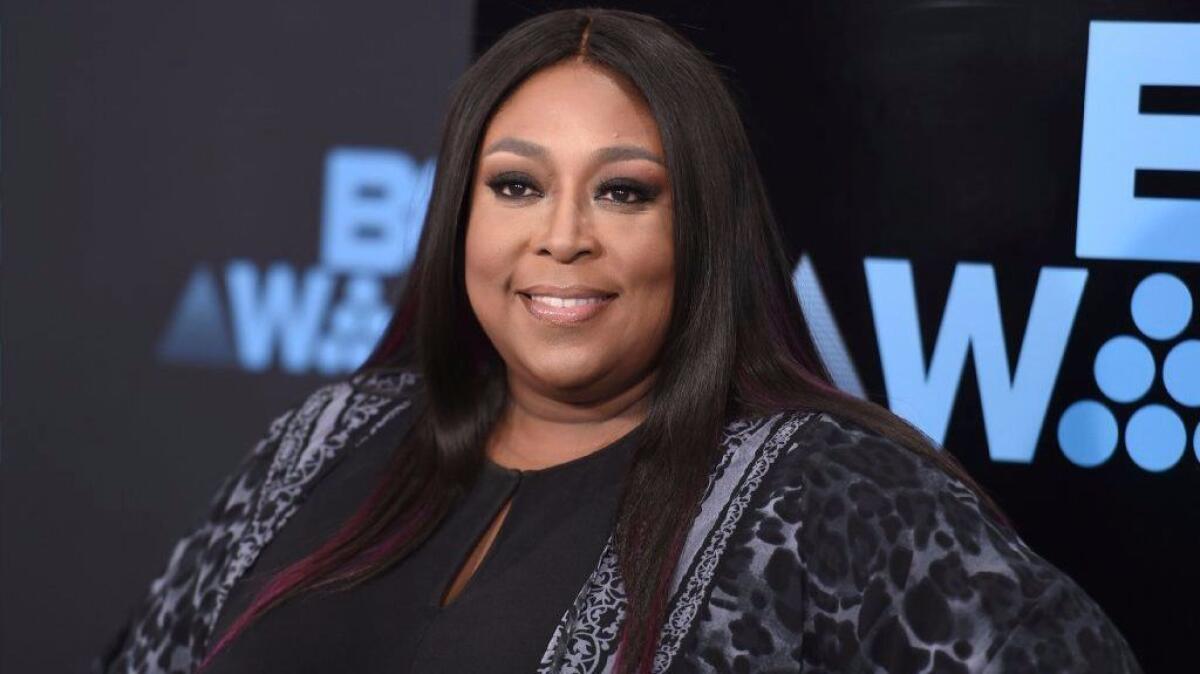‘The Real’ co-host Loni Love has her eyes set on late-night

Loni Love is a comedian and actress. She is currently one of the four co-hosts of “The Real” talk show.
Loni Love wasn’t supposed to be a comedian. Her pursuit of an engineering degree from Prairie View A&M University was proof of that. But while in college, hard up for money for books, she participated in a local bar’s competition in which the person who could tell the best story would win $50. She took home a crisp Ulysses S. Grant, along with the comedy bug.
That first time on stage led to a consistent side hustle in stand-up as she completed her college degree. Upon graduating, she got a job in El Segundo “because Fred Sanford was from El Segundo,” she said.
“Yes, that’s how I picked my life choices,” she laughed.
She worked at Xerox as an engineer for eight years, unhappy along the way. After a fateful night at the Comedy Store, however, when the lineup consisted of just one woman, Love got back into the comedy habit.
“I was doing comedy at night and working at Xerox during the day because I still wanted to eat,” she said.
Her first big break came after an HBO open call for the Aspen Comedy Festival:
“I snuck out of work and went down there. I was No. 253 and had 90 seconds to try and get a spot. There was only one spot for 600 people. I talked about how when I went to Korea they thought I was Aretha Franklin. I got the spot, went to Aspen, got best stand-up and got a deal.”
But Love was still working at Xerox. Then, when the company had layoffs, “I went to my boss and said, ‘Please save a job and lay me off.’”
“That’s how I became a full-time comic.”
Where does your comedy come from?
I’m more of an observational comic. My comedy is from reality, like talking about the Kardashians — they’ve hired more black men than the federal government. [laughs] I use those types of stories to build my act.
What was your first Hollywood audition like?
It was for the movie “Soul Plane.” I was playing Shaniece against Mo’Nique, and I was so scared. There were a million people in the room for the second call back. I read the lines, then the director looked at me and told me to let the paper go. When he said that, being a stand-up, that was it. By the time I was done, they were laughing. From there, I was able to understand what people mean when they say “light up the room.” That’s why I always give that advice: Light that room up. No matter what it needs, give it a little seasoning salt.
That was in 2004. What were the roles like that came your way after that?
For a long time, black women in comedy had to always be sassy. Do the neck, the eye roll. I did a guest spot on one show and I did this one little sassy moment and they made me a regular. It was one line and they were like “We need that sass!”
That's why you only ever saw one black girl, and you knew she was bringing the sass. And then, when you look at me and my physical, I’ve always been a big girl and loud. But there’s a lot of loud big girls that ain’t funny. For me, I had to break out of that — I wanted to be funny.
What I try to do now is break out of those sassy roles. That's what Wanda [Sykes] and
I tell women that you can't look at a
Tina Fey , because it's different. It doesn't mean you won’t get there, but it's different.— Loni Love

You started co-hosting “The Real” in 2013. How was that transition for you?
It’s hard because when you're a stand-up, you’re by yourself. It’s your show. You mess up, don’t nobody know. But when you're on a show, scripted or a talk show, you've got others to work with. It’s kind of constricting. Stand-up is more freeing [in that way].
But on “The Real,” you have to talk about topics and some topics can get heavy, and it's good to have a comic on the panel to bring levity to it. That's what I try to do. The stand-up training helps me with that.
The times for me have changed, even doing a daytime talk show. [The funny black woman] has always been the girl on the end, but I’m in the middle and I monitor what's happening on the table. That’s because of my stand-up background and the engineering. On a panel with five women, you need someone who can listen and think while everyone is talking. The ultimate compliment for me was when there were some talk shows casting and they said they needed “a Loni Love type.” Really?! Well, why don’t y’all call me? Oh, I already got a job. [laughs]
What does success look like for a black female comic?
I think it depends on the individual. We need to get off of the “it's gotta be this, this and that.” Whatever she wants is for her. That’s why you’ve got to set your own goals. When you set your own goals, you ain't gotta compete with anybody else. For me, success is when you're happy and when you become a name and people ain't gotta go “Who?” Figure out what you want your success to be.
I tell women that you can't look at a Tina Fey, because it's different. It doesn't mean you won’t get there, but it's different. And you've got to figure out a way to make it happen because you're not going to be judged like Tina Fey.
What do your career goals look like now?
I’m trying to keep tackling hosting. In daytime, women have always traditionally hosted. But in late-night, it's always been a challenge. I want to tackle a late-night gig. And I kind of have to toot my own horn — I don’t care what she says — I helped Chelsea [Handler] with her show. [laughs] But she encouraged me because when we did “Chelsea Lately,” we did seven seasons of that show and started out with guests from like “Survivor 15,” but she worked herself up. That’s where I’m going next, tackling late-night in the prime-time space.
What advice do you have for younger black women in comedy?
Take all opportunities. Don’t think anything is beneath you. Everybody ain't gonna be Beyonce, and it took her a while to become Beyonce. She was in many groups first and then she became Beyonce.
And show up. That’s 80% of the job. No opportunity is too small, especially in this industry. You don’t know who's going to see it.
Get your life! Follow me on Twitter (@TrevellAnderson) or email me: trevell.anderson@latimes.com.
The biggest entertainment stories
Get our big stories about Hollywood, film, television, music, arts, culture and more right in your inbox as soon as they publish.
You may occasionally receive promotional content from the Los Angeles Times.




